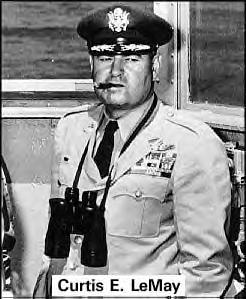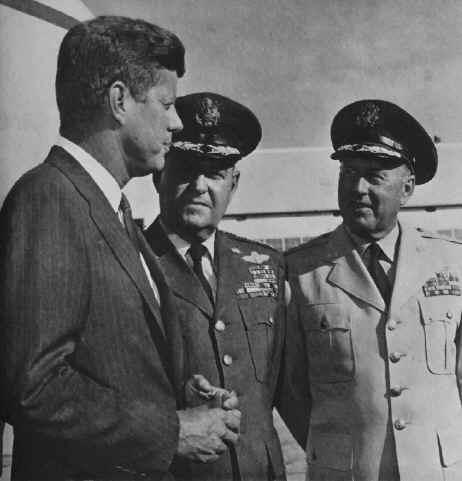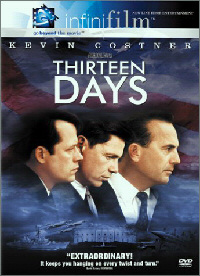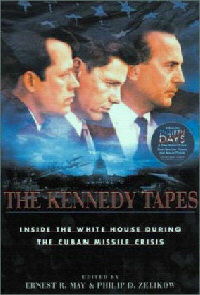|
Curtis LeMay - Demented Cold Warrior
"The reality is that we are a country like any other, with good and evil people, the strong and the weak, noble and criminal acts, with truth often hidden under deception and propaganda." --James K. Galbraith General Curtis LeMay was a
belligerent Cold Warrior who was portrayed in the satirical film Dr. Strangelove,
as the trigger-happy General Jack D. Ripper. Noel Twyman in Bloody Treason wrote of General LeMay's sour relationship with President Kennedy:
"I remember Curtis LeMay sitting there [in the gallery at the JFK autopsy] with a big cigar in his hand." --Paul O'Connor, laboratory technologist who assisted in the autopsy of President Kennedy, cited by William Law, In the Eye of History "Restraint! Why are you so concerned with saving their lives? The whole idea is to kill the bastards! At the end of the war, if there are two Americans and one Russian, we win!" --Thomas Power, commander in chief of the Strategic Air Command from 1957 to 1964, speaking to William Kaufmann of the RAND Corporation in 1960, cited by Fred Kaplan, The Wizards of Armageddon "Well, maybe if we do this overflight right, we can get World War III started." --Curtis LeMay, speaking to RB-47 'Stratojet' crew member Hal Austin of the 91st Strategic Reconnaissance Wing, cited by Paul Lashmar, Washington Post, "Stranger than 'Strangelove': A General's Forays into the Nuclear Zone," 3 July 1994, C9 "Looking back on that whole Cuban mess, one of the things that appalled me most was the lack of broad judgment by some of the heads of the military services. When you think of the long competitive selection process that they have to weather to end up the number one man of their particular service, it is certainly not unreasonable to expect that they would also be bright, with good broad judgment. For years I've been looking at those rows of ribbons and those four stars, and conceding a certain higher qualification not obtained in civilian life. Well, if ------- and ------- are the best the services can produce, a lot more attention is going to be given their advice in the future before any action is taken as a result of it." --President Kennedy, speaking to Assistant Navy Secretary Paul Fay, The Pleasure of His Company "At a Georgetown dinner party recently, the wife of a leading senator sat next to Gen. Curtis LeMay, chief of staff of the Air Force. He told her a nuclear war was inevitable. It would begin in December and be all over by the first of the year. In that interval, every major American city -- Washington, New York, Philadelphia, Detroit, Chicago, Los Angeles -- would be reduced to rubble. Similarly, the principal cities of the Soviet Union would be destroyed. The lady, as she tells it, asked if there were any place where she could take her children and grandchildren to safety; the general would, of course, at the first alert be inside the top-secret underground hideout near Washington from which the retaliatory strike would be directed. He told her that certain unpopulated areas in the far west would be safest." --Marquis Childs, nationally syndicated columnist, Washington Post, 19 July 1961 Resources:
"It wasn't until nearly thirty years after [the Cuban missile crisis] that we learned, from General Gribkovi's testimony ... that the nuclear warheads for both tactical and strategic nuclear weapons had already reached Cuba before the quarantine line was established -- 162 nuclear warheads in all. If the president had gone ahead with the air strike and invasion of Cuba, the invasion forces almost surely would have been met by nuclear fire, requiring a nuclear response from the United States." --Robert McNamara, Secretary of Defense under Kennedy "If John Kennedy had followed LeMay's advice, history would have forgotten the Nazis and their terrible Holocaust. Ours would have been the historic omnicide." --Richard Rhodes, Dark Sun: The Making of the Hydrogen Bomb "History teaches us that enmities between nations, as between individuals, do not last forever. However fixed our likes and dislikes may seem, the tide of time and events will often bring surprising changes in the relations between nations and neighbors.... So let us not be blind to our differences, but let us also direct attention to our common interests and the means by which those differences can be resolved. And if we cannot end now our differences, at least we can help make the world safe for diversity. For in the final analysis, our most basic common link is that we all inhabit this small planet. We all breathe the same air. We all cherish our children's futures. And we are all mortal." --John F. Kennedy, speech before American University, 10 June 1963 "Nobody is going to force me to do anything I don't think is in the best interest of the country. I will never compromise the principles on which this country is built, but we're not going to plunge into an irresponsible action just because a fanatical fringe in this country puts so-called national pride above national reason. Do you think I'm going to carry on my conscience the responsibility for the wanton maiming and killing of children like our children we saw here this evening? Do you think I'm going to cause a nuclear exchange -- for what? Because I was forced into doing something that I didn't think was proper and right? Well, if you or anybody else thinks I am, he's crazy." --President Kennedy, after the Bay of Pigs fiasco, speaking to Assistant Navy Secretary Paul Fay, The Pleasure of His Company "Civilians can scarcely understand or even believe that many ambitious military professionals truly yearn for wars and the opportunities for glory and distinction afforded only in combat. A career of peacetime duty is a dull and frustrating prospect for the normal regular officer to contemplate.... Wars and emergencies put the military and their leaders on the front pages and give status and prestige to the professionals. Wars add to the military traditions, the self-nourishment of heroic deeds, and provide a new crop of military leaders who become the rededicated disciples of the code of service and military action. Being recognized public figures in a nation always seeking folk heroes, the military leaders have been largely exempt from the criticism experienced by the more plebeian politician. Flag officers are considered 'experts,' and their views are often accepted by the press and Congress as the gospel.... Standing closely behind these leaders, encouraging and prompting them, are the rich and powerful defense industries. Standing in front, adorned with service caps, ribbons, and lapel emblems, is a nation of veterans -- patriotic, belligerent, romantic, and well intentioned, finding a certain sublimation and excitement in their country’s latest military venture." --David Shoup, former Commandant of the Marine Corps and member of the Joints Chiefs of Staff, The Atlantic, "The New American Militarism," April 1969 "The danger which troubled my husband was that war might be started not so much by the big men as by the little ones. While big men know the need for self-control and restraint, little men are sometimes moved more by fear and pride." --Jacqueline Kennedy, President Kennedy's widow, in a letter to Soviet Premier Nikita Khrushchev, 1 December 1963, cited by William Manchester, The Death of a President "We were deeply concerned that Khrushchev would respond [to an attack on Cuba] with an attack on Berlin, where he had the geographic advantage, and with nuclear weapons, which would have transformed that local battle into a terrible global struggle." --Theodore Sorensen, Special Counsel to John F. Kennedy, interviewed on CNN.com/ColdWar, 29 November 1998 "President [Kennedy] heroically kept the country out of war -- against relentless pressure from hard-liners in the Pentagon, CIA and his own White House, who were determined to militarily engage the enemy in Berlin, Laos, Vietnam and especially Cuba. Kennedy knew that any such military confrontation could quickly escalate into a nuclear war with the Soviet Union. And he realized that a full-scale invasion of Cuba or Vietnam could become hopelessly bogged down, turning into a bloody and endless occupation.... The only reason Cuba didn't become the Iraq of its day was that Kennedy was too wise to be snookered by hard-liners into this trap. He had already been misled early in his administration by the CIA, which convinced him that its ragtag army of Cuban exiles could defeat Castro at the Bay of Pigs. JFK vowed that he would never again listen to these so-called national security experts...." --David Talbot, Salon, "The Kennedy Legacy vs. the Bush Legacy," 2 May 2007 "Arthur Schlesinger Jr., in his book 'Robert Kennedy and His Times,' documents other episodes showing President Kennedy's determination not to let Vietnam become an American war. One was when Gen. Douglas MacArthur told him it would be foolish to fight again in Asia and that the problem should be solved at the diplomatic table. Later General Taylor said that MacArthur's views made 'a hell of an impression on the President ... so that whenever he'd get this military advice from the Joint Chiefs or from me or anyone else, he'd say, 'Well, now, you gentlemen, you go back and convince General MacArthur, then I'll be convinced.'" --Roger Hilsman, Assistant Secretary of State for Far Eastern Affairs under President Kennedy, letter to The New York Times, 20 January 1992 "The global balance of terror, pioneered by the United States and the Soviet Union, holds hostage the citizens of the Earth. Each side draws limits on the permissible behavior of the other. The potential enemy is assured that if the limit is transgressed, nuclear war will follow. However, the definition of the limit changes from time to time. Each side must be quite confident that the other understands the new limits. Each side is tempted to increase its military advantage, but not in so striking a way as seriously to alarm the other. Each side continually explores the limits of the other's tolerance, as in flights of nuclear bombers over the Arctic wastes; the Cuban missile crisis; the testing of anti-satellite weapons; the Vietnam and Afghanistan wars -- a few entries from a long and dolorous list. The global balance of terror is a very delicate balance. It depends on things not going wrong, on mistakes not being made, on the reptilian passions not being seriously aroused." --Carl Sagan, Cosmos
9/11 - Anatomy of a Great Deception "Real patriots ask questions." --Carl Sagan "Unthinking respect for authority is the greatest enemy of truth." --Albert Einstein |



